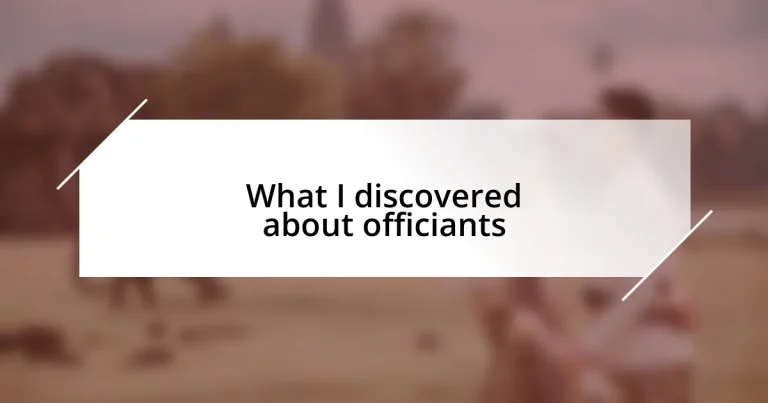Key takeaways:
- Officiants play a crucial role in weddings by personalizing ceremonies and setting the emotional tone for the event.
- Different types of officiants (religious, civil, specialized) bring unique elements, reflecting the couple’s values and preferences.
- Asking the right questions can help couples find an officiant who aligns with their vision and can personalize the ceremony effectively.
- Legal considerations, such as the officiant’s authority and proper documentation, are essential to ensure the wedding is officially recognized.
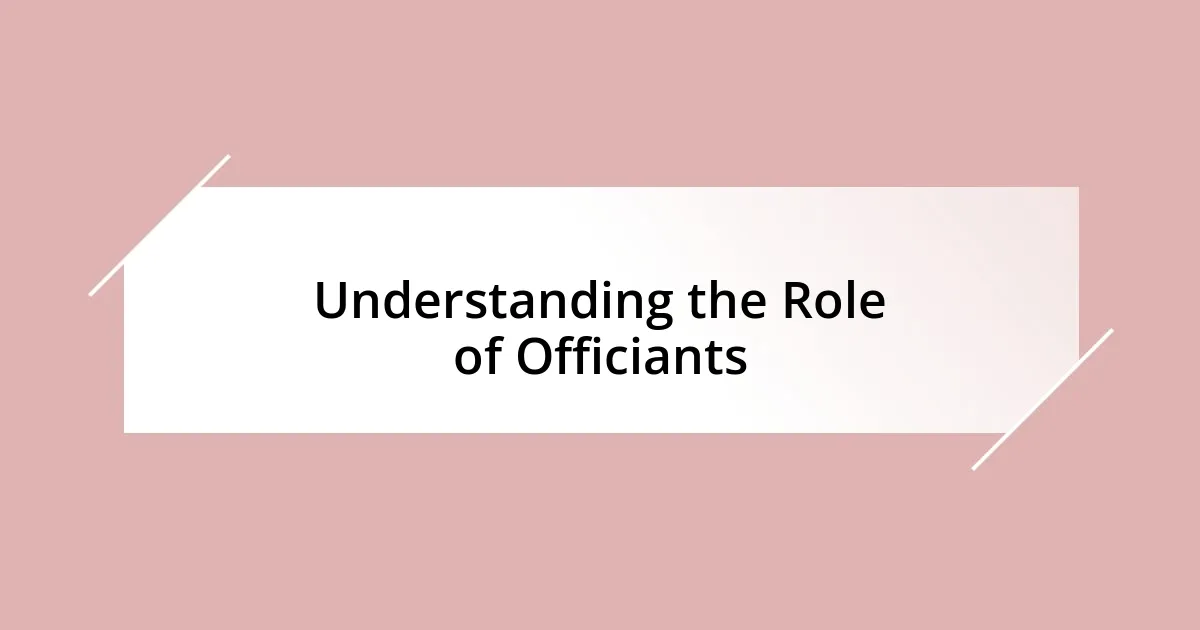
Understanding the Role of Officiants
Officiants are the guiding figures in significant life events, primarily weddings, where their role transcends mere logistical duties. I remember attending a friend’s wedding and feeling the warmth and sincerity radiating from the officiant as they shared personal reflections about love and partnership. It made me wonder: how much impact does an officiant have in shaping the couple’s special day?
As I delved deeper into this role, I realized that officiants not only perform ceremonies but also help convey the couple’s story to their guests. Each ceremony can be customized to reflect the unique journey of the couple. I once spoke with an officiant who shared how he often weaves in anecdotes from the couple’s relationship, making the ceremony feel deeply personal. Isn’t it fascinating how a simple story can create a stronger connection during such a pivotal moment?
Another layer to the officiant’s responsibilities is the ability to facilitate a serene atmosphere, especially amidst the flurry of wedding day chaos. Witnessing an officiant calm nerves and bring everyone together reminded me how crucial this role is—like the conductor of an orchestra, ensuring each note hits just right. Have you ever thought about how much an officiant’s presence can set the tone for the entire celebration? It’s this unique blend of authority and warmth that truly defines the essence of officiating.
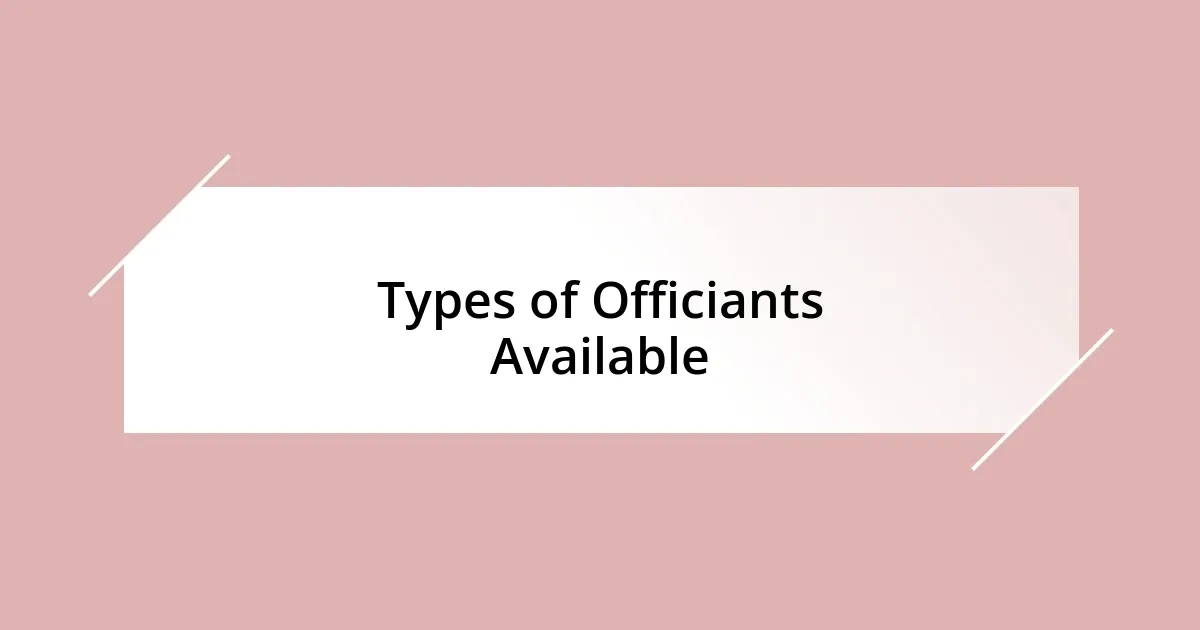
Types of Officiants Available
Officiants come in various types, each bringing a unique flavor to ceremonies. Personally, I’ve had the pleasure of witnessing different officiants at various weddings. From religious clerics to secular celebrants, their approach significantly impacts the overall vibe of the event. For instance, I once attended a wedding led by a religious officiant who infused tradition into every word, creating a reverent atmosphere that resonated with the couple’s beliefs.
Another type that’s gained popularity is the civil officiant, primarily focusing on the legal aspects of the wedding without any religious connotations. I recall a couple who chose this path for their nuptials; the officiant was relaxed yet professional, allowing them to express their love in a straightforward manner. Your choice of officiant can truly reflect your values and preferences, making the day feel distinctly yours.
You’ll also encounter specialized officiants, like those who focus on themed weddings or specific cultural ceremonies. I remember attending a fantastical themed wedding where the officiant dressed in costume, creating an immersive experience for everyone involved. It’s remarkable how different officiants can cater to unique visions, enriching the celebration. Consider what resonates with you when choosing an officiant, as it could transform your special day into something unforgettable.
| Type of Officiant | Description |
|---|---|
| Religious Officiants | Leverage spiritual traditions to conduct ceremonies |
| Civil Officiants | Focus on the legal aspects; often secular |
| Specialized Officiants | Cater to themed or cultural ceremonies |
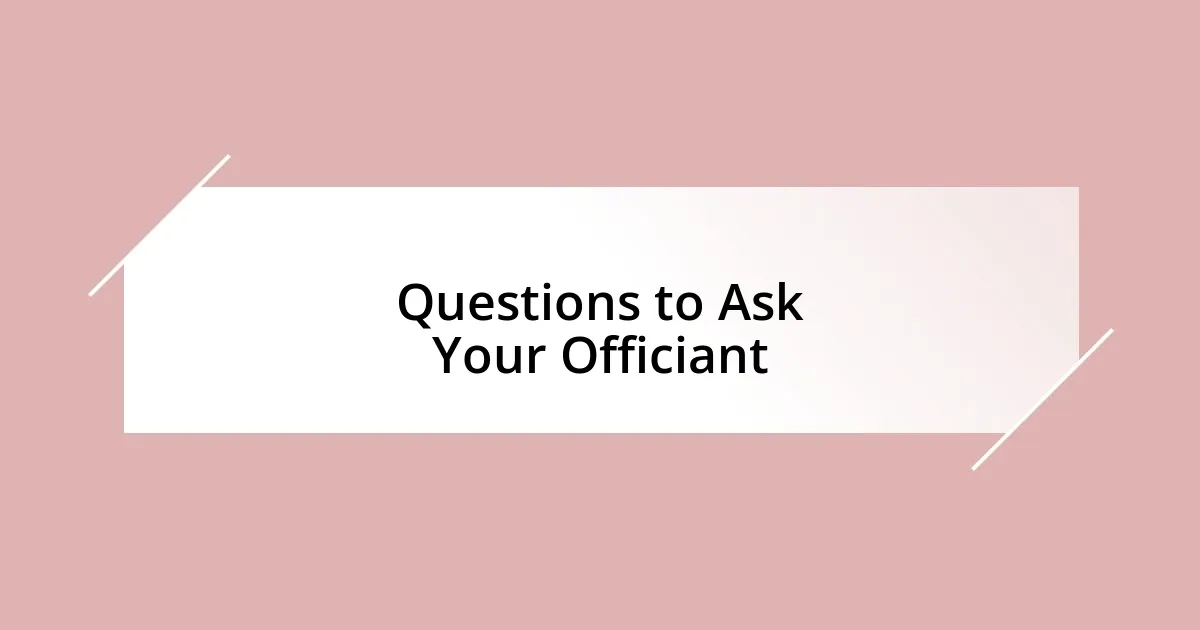
Questions to Ask Your Officiant
It’s essential to have the right conversation with your officiant to set the tone for your wedding. From my own experiences, I’ve learned that asking the right questions can reveal not only their style but also how they can personalize your ceremony. I once asked an officiant about their approach to vows, and their thoughtful response made it clear they prioritize capturing each couple’s unique voice, which is exactly what we wanted.
Here’s a list of crucial questions to consider when speaking with your officiant:
- What is your experience with our type of ceremony?
- Can you share examples of personalized vows you’ve helped couples create?
- How do you integrate our love story into the ceremony?
- What do you need from us in the months leading up to the wedding?
- Are you open to including cultural or family traditions that are important to us?
- How do you handle unexpected situations on the wedding day?
These inquiries not only help gauge their flexibility but also reveal how invested they are in making your day memorable. In my experience, an officiant who takes the time to understand your vision is invaluable.
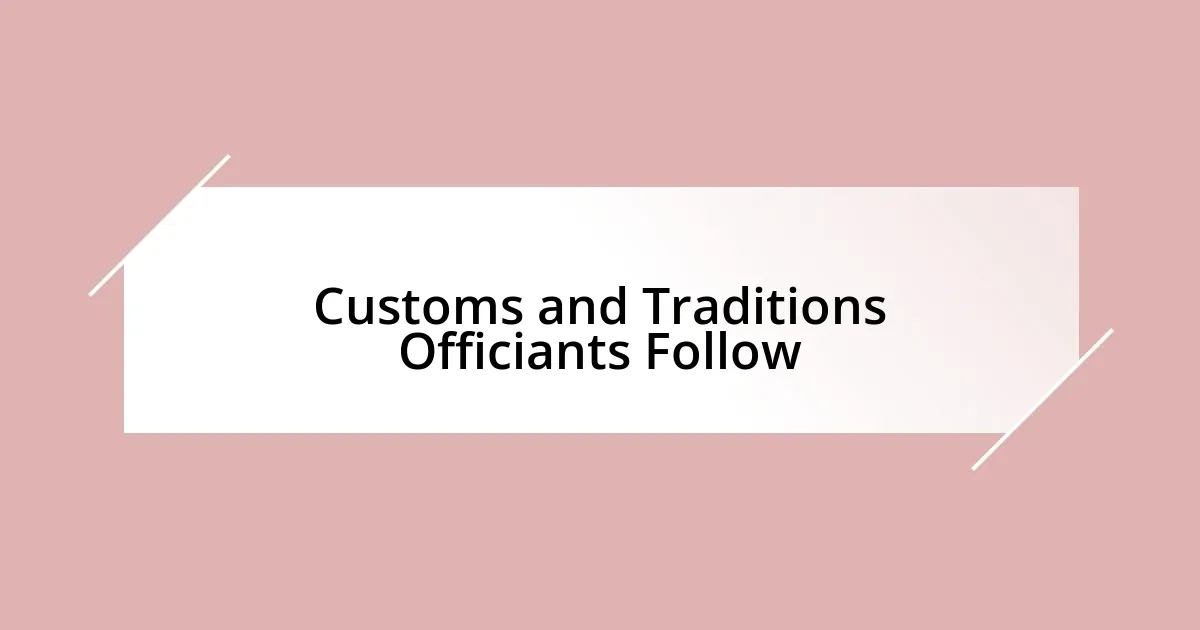
Customs and Traditions Officiants Follow
Officiants often embrace various customs and traditions that reflect the beliefs and values of the couple they’re serving. I remember attending a wedding where the officiant beautifully blended cultural rituals with the couple’s modern preferences. It struck me how they incorporated the ritual of lighting a unity candle, symbolizing the couple’s two lives merging into one. Can you imagine how touching that moment was? It created such an emotional connection for everyone present, highlighting the significance of their journey.
In addition to specific rites, many officiants emphasize the importance of personalized vows and stories during the ceremony. I once saw an officiant who took the time to weave a couple’s unique love story into the narrative of the ceremony, using light humor and heartfelt anecdotes. It made everyone feel like they shared a glimpse into their relationship, sparking laughter and joyful tears. Have you ever felt more engaged in a ceremony because of such personal touches? It surely amplified the significance of the occasion for everyone involved.
There’s also a sense of structure that officiants adhere to, which often includes specific sequence elements—like the exchange of rings or the declaration of marital status. When I was at a ceremony led by a professional officiant, I noticed how perfectly timed each component was. They had a way of guiding the couple and guests through the experience smoothly. It made me reflect on how the traditional flow retains its charm and dignity, even as modern elements are woven in. This balance of old and new adds a rich layer to each celebration.
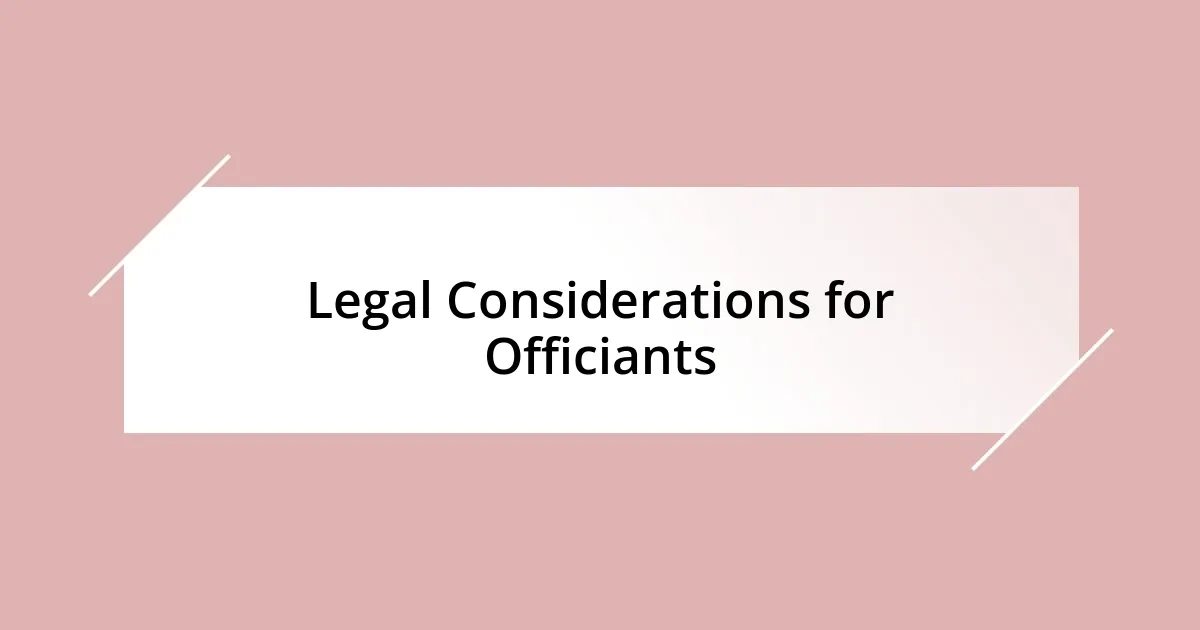
Legal Considerations for Officiants
When considering officiants for your ceremony, it’s vital to understand the legal requirements in your state or country. I recall the first wedding I attended where the officiant had meticulous documentation—licenses, permits, and all the necessary paperwork. It made me appreciate how much goes into being recognized as an official party for such a significant event. Are you aware that some regions require officiants to register ahead of time? Missing this step can lead to frustrating last-minute complications.
One aspect that often goes unnoticed is the officiant’s authority to perform the ceremony. I once learned that, in some jurisdictions, only certain individuals—like religious leaders or court officials—are legally permitted to officiate weddings. This can vary widely, and I was surprised to find out how many couples assume anyone can step into that role. It’s crucial to verify that your officiant meets these legal standards to avoid any unforeseen challenges on your big day.
Finally, let’s talk about the importance of recording the marriage. I’ve seen couples become so caught up in the ceremony that they forget this essential detail. An officiant needs to ensure that the marriage license is properly signed and submitted. Picture this: you’ve just exchanged heartfelt vows and you’re celebrating your love, but the marriage isn’t officially recognized because of an oversight. It’s a daunting thought, isn’t it? Paying attention to these legal elements can truly help ensure your wedding day flows smoothly and meaningfully.












